By Marty Toohey
For the past decade, Austin’s ambition to become the world’s clean-energy capital has been best exemplified by one effort: GreenChoice, a program that sells electricity generated entirely from renewable sources such as wind. Now the nationally renowned program is struggling to find buyers - the latest allotment is 99 percent unsold after seven months on the market - and Austin Energy is looking for ways to bring down the rising costs.
But those are short-term talks. Austin Energy officials say that times have changed and that the nation’s most successful (by volume of sales) green-energy program, which offers the renewable energy only to those who select it, might no longer be the best way to carry out the city’s goals. It now costs almost three times more than the standard electricity rate. “I think it’s time to sit back and look at the philosophy behind GreenChoice,” said Roger Duncan, the head of Austin Energy and the chief architect of GreenChoice.
It was established in 2000, when Austin Energy decided to buy power coming from a wind farm in West Texas. Customers could choose to get their electricity entirely from the plant. About 3,500 homes and businesses signed up. As Austin Energy bought wind from additional plants, it began offering successive GreenChoice “batches.” Some customers may have signed up out of a personal or corporate commitment to environmental responsibility.
But, Austin Energy spokesman Ed Clark said, many were attracted to the certainty that GreenChoice provided. Although it generally cost a little more than standard electricity, a GreenChoice contract guaranteed a price would not change for a decade. Because of that promise, there were times when coal, oil and natural gas prices spiked and made them more expensive than GreenChoice. “Customers got a 10-year fixed cost - that’s why it sold out,” Clark said. “It was designed to be a value proposition to customers, instead of just asking them to pay more to be environmentally friendly.”
But lately, customers haven’t been sold on that proposition. While previous offerings took about half a year to sell out, the current one has attracted only 104 homes and five businesses - leaving about 99 percent of its power unpurchased, according to Austin Energy. The reason is that GreenChoice prices have risen more than fivefold since the program started. GreenChoice now would add about $58 a month to the electricity bill of an average home.
Businesses, which currently buy 83 percent of GreenChoice power and which tend to have much larger monthly bills, face bigger hits to their bottom line. Austin Energy officials say GreenChoice prices have risen mainly for reasons beyond their control. Steel, concrete, copper and labor have all gotten more expensive, in turn making wind-farm construction more costly.
But there is another problem that could soon be resolved, he said. Texas doesn’t have enough transmission lines to carry all the electricity generated in West Texas to the state’s big cities. This in turn means Austin has to pay more to get its wind energy here. But, Sweeney said, the state is in the process of approving a plan for utilities to build $6 billion in new transmission lines. This change could allow Austin Energy to lower its GreenChoice price. But, Sweeney cautioned, any lowering of costs “won’t be dramatic.” Others say the city could cut the cost more than it’s letting on.
City officials say that despite the price spike, they will not abandon wind energy. Partly, this is because they expect wind prices to stabilize while fossil-fuel prices rise dramatically. Partly, it’s because the City Council has mandated that Austin Energy generate 30 percent of its electricity from renewable sources by 2020. But even if Austin Energy manages to bring down the price of wind power, GreenChoice will face other challenges.
For instance, the city has to sell the power from the solar array near Webberville. Some businesses have objected to paying for the relatively expensive power. The City Council’s solution was to tell Austin Energy to explore offering the solar power under GreenChoice. But, as Duncan noted to the City Council, the current batch of GreenChoice is already struggling because of its price. And power from the solar array will cost about twice as much. Read more.
By Matt Vooro
The AMO is an ongoing series of long-duration changes in the sea surface temperature of the North Atlantic Ocean, with cool and warm phases that may last for 20-40 years at a time and a difference of about 1F between extremes. These changes are natural and have been occurring for at least the last 1,000 years. [per NOAA].
The AMO index is calculated at NOAAPSD by using the Kaplan SST data set [5x5], determining the area weighted average over the North Atlantic over 0-70N and then detrending this data. The average AMO index or the Atlantic Multidecadal Oscillation index went negative or cool in January 2009 The average for the first 5 months this year is about [-0.06] . It has been cooling since 2003. In the past, the very cold seasons of North America and especially the East coast happened when the annual average AMO went cool [ as low as -0.405] in the 1970’s.
It seems that this level of cool AMO may be several years off as the AMO cooling rate appears to be still slow. Back in 1964 it took about 8 years before the AMO went to [-0.3] by 1971. Review of other periods for similar rates of decline of the AMO show a spread of about 2-8 years. However the solar activity was much higher during 1964-1972 and things may cool down faster currently with extended solar minimum and anticipated low future solar cycles. If AMO does drop faster, then the cold weather like 1964-1979 may be the norm here much sooner and the East Coast will cool down as well as will the globe. The most sustained number of low AMO levels was during the cold spell of 1902 -1925 and again the 1970’s.
The graph below shows how closely Annual Global Air Temperature Anomalies [Crutem3] follow the Atlantic Multidecadal Oscillation Index [AMO] below and enlarged here.
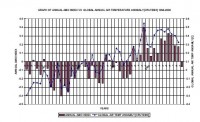
The last interval change was 1994 or about 15 years ago and according to Enfeld et.al (2005), the probability that AMO will switch to cool in 15 years is about 80%. Based on this analysis , there is a high probability that the current cooling phase of AMO which started in 2009 is real and likely sustainable for the next 20 years at least.
The graph below shows the decline of the AMO index from warm to cool between 2005 and 2009 below and enlarged here.
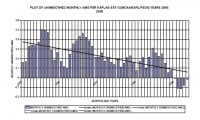
EL NINO 2009-2010
There has been an El Nino within about 12 months after each of the last four solar minimums. The same pattern seems to be developing again now. The El Nino may be a moderate or weak and short lived [about a year]. It may have a minor effect on global temperatures, like in the period 1965-1966 when US temperatures continued to drop despite the El Nino.
AMO appears to be like a thermostat or predictor of global temperatures. ENSO events if moderate or strong seem to modify, amplify or over-ride the AMO effects. This pattern will continue to bring cool yearly temperatures and colder and snowy winters like 2008 and 2009. My best guess is that the climate of the 1960’and 1970’s will be our climate for the next several decades [2-3] at least, and inter-dispersed with periodic warm years. PDO and AMO readings are of limited value for short term use but quite useful and accurate for decadal forecasts. Currently 2009 looks something like 1971 [cool PDO, low cool/ near neutral AMO] and the rest of this decade looks like the 1970’s if you had pick one decade from the past. The 1960’s and the 1950 are also close behind.
This latest period of cooler weather is not the start of some modern ice age or new grand cold minimum but just another cool cycle of the planet that happens about after every 20-30 years more recently when AMO and PDO are both in the cool mode simultaneously. The coldest last such cycle 1902-1925 when AMO hit a single month low of -0.563 and PDO went down to -1.72 and global air temperature anomalies plummeted to -0.581C [crutem3] in 1911. Other such cool periods occurred 1964-1976 and also much earlier during the Dalton and Maunder Minimums. Read more here.
Icecap notes: See Matt’s earlier post here. See a 2008 post by Dr. Don Easterbrook on the PDO and NAO influences on a cooling climate here.
See also my recent Intellicast post “ El Ninos in a Cold PDO - Are they Different?”. See another older post “Taking a Time Machine Ride Back to the 1960s or 1800s?”. See also a story on the AMO here and PDO here. Another upcoming story will support Matt’s view on this upcoming El Nino. See an older Icecap post on the role of the oceans in climate here.
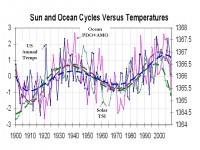
See how well the annual US temperatures (USHCNv2) correlates with both the oceans (PDO + AMO) and sun (Hoyt Schatten Willson Total Solar Irradiance or TSI calibrated to ACRIM). Enlarged here.

See larger version here of a simple multiple regression model using smoothed (11 point) PDO and AMO and USHCN v2 temperatures (r-squared 0.85).
Senator James Inhofe in the Politico
Listen carefully in Washington, and almost everyone agrees that nuclear energy must be a part of our future domestic energy mix, and for good reason: Nuclear energy is the world’s largest source of carbon-free energy, generating over 70 percent of our emission-free electricity here in the U.S. Nuclear energy is a clean, safe, reliable and domestic source of affordable energy that has created 15,000 new jobs in the last year.
The need to grow our domestic energy supply is clear. The Energy Information Administration projects that our demand for electricity will increase by 26 percent by the year 2030, requiring nearly 260 gigawatts of new electricity generation. Every source will need to grow and produce more energy to meet that demand. Curtis Frasier, executive vice president of Americas Shell Gas & Power, recently warned that the recession could be masking a global energy shortage: “When the economy returns, we’re going to be back to the energy crisis,” he said. “Nothing has been done to solve that crisis. We’ve got a huge mountain to climb.”
Frasier voices a very real concern. Electricity and total energy use are closely tied to economic growth. When our economy grows, so does the demand for energy. One way our energy policy can provide a solid foundation for economic growth is by supporting increased development of nuclear energy.
Not only will nuclear energy give a boost to our economy, it will also produce new jobs. Mark Ayers, president of the AFL-CIO Building and Construction Trades Department, has stated: “We will work closely with the nuclear energy industry to help pursue the adoption of a diverse American energy portfolio that places a high priority on the re-emergence of nuclear power.” Why is Ayers so supportive of nuclear energy? He knows the number of high-quality jobs that just one new nuclear plant would provide, including 1,400 to 1,800 jobs during construction; 400 to 700 permanent jobs when the plant begins operating, with salaries percent higher than the local average; and 400 to 700 additional jobs providing goods and services.
Ensuring nuclear energy continues to play an increasing role in our nation’s energy mix requires a commitment from Capitol Hill. My commitment is rooted in oversight, which I initiated over 12 years ago through my leadership position on the Senate Environment and Public Works Committee. The Nuclear Regulatory Commission has since been transformed into a more safety-focused, objective and efficient regulator capable of executing its responsibilities in a timely fashion. As such, I expect the NRC to maintain the high level of safety of the existing fleet while managing the additional challenge of new plant licensing.
So far, the NRC has done a good job coping with the onslaught of licensing activity. Reviews are proceeding simultaneously on four designs, one site permit and 18 license applications representing 28 new reactors. But, despite significant efforts on the part of NRC staff, this process hasn’t unfolded as smoothly as it could. In fact, there appear to be no actual dates when any of the new plant licenses will be issued. The commission must take responsibility for managing the licensing process and set detailed schedules, which are critical to ensuring that the process is safety-focused and efficient.
Companies will make decisions on whether to start construction based on future economics and perceived political risk. If the NRC becomes an unpredictable regulator, financial risk will escalate. How can a utility prepare for construction without a firm date on which they can expect to receive their license? How can an investor judge the risk of a project without being able to evaluate progress in the regulatory process?
My hope is to see the NRC issue the first new license for a reactor before the end of 2011, and eight more before 2013. Given construction estimates of four to five years, the first two reactors could be operational in 2016, with 14 more potentially operational by 2018. Sixteen new reactors will be a good start toward rejuvenating an industry that has been stagnant for over 30 years. These efforts to develop new plants are critical to meeting our energy needs, and I’m committed to doing what I can to help build these new plants.
Finally, if President Barack Obama is serious about creating jobs, cutting carbon emissions and producing more clean, domestic energy, it’s time for him to unambiguously support nuclear energy. There is one action more important than any other that he alone can take: nominating qualified, safety-focused and fair people to serve on the NRC. Our nation is best served by commissioners who are focused on protecting public health and safety and the environment. However, if Obama’s nominations reflect the desires of anti-nuclear ideologues, one thing will become clear: He’s willing to strangle the nuclear renaissance along with energy security and job creation. If that’s the case, then all his talk about the need to cut carbon emissions is just blowing smoke. See the op ed here.
Sen. James Inhofe (R-Okla.) is the ranking member of the Senate Environment and Public Works Committee.
By Marc Morano. Climate Depot
Below is an excerpt of NASA scientist James Hansen’s critique of the President Obama supported Waxman-Markey global warming cap-and-trade bill that passed the House and is now under consideration in the U.S. Senate. Hansen’s full critique appeared on July 9, 2009 in The Huffington Post. Hansen is director of the NASA Goddard Institute for Space Studies, but he writes on this policy-related topic as a private citizen.

Jim Hansen Excerpt:
“It didn’t take long for the counterfeit climate bill known as Waxman-Markey to push back against President Obama’s agenda. As the president was arriving in Italy for his first Group of Eight summit, the New York Times was reporting that efforts to close ranks on global warming between the G-8 and the emerging economies had already tanked.
This requires nothing less than an energy revolution based on efficiency and carbon-free energy sources. Alas, we won’t get there with the Waxman-Markey bill, a monstrous absurdity hatched in Washington after energetic insemination by special interests.
For all its “green” aura, Waxman-Markey locks in fossil fuel business-as-usual and garlands it with a Ponzi-like “cap-and-trade” scheme.
The fact is that the climate course set by Waxman-Markey is a disaster course. Their bill is an astoundingly inefficient way to get a tiny reduction of emissions. It’s less than worthless, because it will delay by at least a decade starting on a path that is fundamentally sound from the standpoints of both economics and climate preservation.
Here are a few of the bill’s egregious flaws:
* It guts the Clean Air Act, removing EPA’s ability to regulate CO2 emissions from power plants.
* It sets meager targets—2020 emissions are to be a paltry 13% less than this year’s level—and sabotages even these by permitting fictitious “offsets,” by which other nations are paid to preserve forests - while logging and food production will simply move elsewhere to meet market demand.
* Its cap-and-trade system, reports former U.S. Undersecretary of Commerce for Economic Affairs Robert Shapiro, “has no provisions to prevent insider trading by utilities and energy companies or a financial meltdown from speculators trading frantically in the permits and their derivatives.”
* It fails to set predictable prices for carbon, without which, Shapiro notes, “businesses and households won’t be able to calculate whether developing and using less carbon-intensive energy and technologies makes economic sense,” thus ensuring that millions of carbon-critical decisions fall short.” End Hansen Excerpt.
Climate Depot Editorial Note:
Even the strongest proponents of man-made global warming fears - NASA’s James Hansen and UK’s James Lovelock—are now ridiculing the Congressional cap-and-trade approach as “ineffectual” and “verging on a gigantic scam.” Adding to that, Green Party presidential nominee Ralph Nader has also voiced opposition to this bill, saying, “I’m really astonished… I mean, it’s not going to work. It’s too complex. It’s too easily manipulated politically.” Read more here.
CHICAGO (AFP) - Greenpeace activists were arrested Wednesday for scaling Mount Rushmore and hanging a banner next to the carved face of Abraham Lincoln urging President Barack Obama to get tough on climate change.
A video posted on the environmental group’s website showed the massive banner hanging on the South Dakota mountain face.
Its message -- “America honors leaders not politicians: Stop Global Warming” and an unfinished portrait of Obama -- was barely visible as it was whipped by wind.
“Doing what it takes to solve global warming demands real political courage,” Greenpeace USA deputy campaigns director Carroll Muffett said in a statement.
“If President Obama intends to earn a place among this country’s true leaders, he needs to show that courage, and base his actions on the scientific reality rather than political convenience.”
The protest comes as Obama meets with other G8 leaders in Italy. G8 leaders agreed to bear the brunt of steep global cuts in greenhouse gas emissions, saying developed countries should reduce their pollution by 80 percent by 2050, a summit declaration said.
Greenpeace said the 11 climbers “took special care not to damage the monument, using existing anchors placed by the National Park Service for periodic cleaning.” Park officials said they were still investigating whether the iconic monument—a restricted area which is closely monitored—suffered damage.
“Early this morning visitors saw these individuals on the mountain,” said Amy Bracewell, a spokeswoman for the National Park Service. “They got up next to Abraham Lincoln and unfurled the large banner,” she told AFP. “As soon as our people were mobilized we took down the banner and apprehended them and got them safely down the mountain.”

In this picture provided by the environmental group Greenpeace, Greenpeace climbers rappel down the face of Mount Rushmore National Memorial in Keystone, S.D. on Wednesday, July 8, 2009 to unfurl a banner that challenges President Obama to show leadership on global warming. Obama is at the G8 meeting in Italy to discuss the global warming crisis with other world leaders. A federal prosecutor says a dozen people were taken into custody on Wednesday after the incident. (AP Photo/Greenpeace, Kate Davison)
See how the environmentalists including the Mt. Rushmore protestors think that the stinking pile of manure that is Waxman-Markey Cap-and-Tax did not go far enough in this New York Times story.
Note: NOAA in a press release announced: The 2009 Volvo Environmental Prize Foundation has named NOAA Senior Scientist Susan Solomon as the recipient of its 2009 environmental prize. The Volvo Environment Prize is awarded for “Outstanding innovations or scientific discoveries which in broad terms fall within the environmental field.” “This prestigious award recognizes and honors Dr. Solomon’s distinguished work in the Antarctic as well as her exemplary leadership during the last Intergovernmental Panel on Climate Change assessment,” said Richard W. SPINrad, NOAA assistant administrator for oceanic and atmospheric research. “Throughout her career, she has coupled preeminent science with service to society. We, at NOAA are honored to see our colleague, Dr. Solomon recognized with this award.”
See this multi-author story from SPPI that suggests yet another ridiculous award and step down for NOAA. I had a Volvo once and loved it. It will be my last.
The Unwisdom of Solomon
Bad logic, bad science, and bad policies
By SPPI
Early in 2009, the Proceedings of the National Academy of Sciences published “Irreversible climate change due to carbon dioxide emissions,” by Susan
Solomon of NOAA and three colleagues. This lurid paper said that “the severity of damaging, human-induced climate change depends not only on the magnitude of the change but also on the potential for irreversibility,” and that “the climate change that takes place due to increases in CO2 concentration is largely irreversible for 1000 years after emissions stop.”
The Solomon paper talks of “irreversible impacts,” such as dry-season reductions in rainfall leading to “dustbowl” conditions in several regions, “inexorable sea-level rise” of “several meters.” However, the paper is entirely predicated on two implicit but false assumptions: that the computer modeling on which all of its conclusions are based is competent to predict the state of the climate a millennium or more in the future; and that the effect of atmospheric carbon-dioxide enrichment on global mean surface temperatures will be substantial.
Can computer modeling predict climate changes 1000 years from now? New claims by the narrow faction advocating catastrophic “global warming” are
more frequently or more justifiably ridiculed in the public mind than the claim that computer models that are repeatedly proven incapable of reliably predicting the weather even a week ahead can somehow be expected successfully to predict the climate 1000 years ahead. Not one of those models predicted the phase-transition in global mean surface temperatures that occurred late in 2001, since when there have been seven years of global cooling at a rate equivalent to close to 2 Celsius degrees (3.5F) per century:

See larger size here.
Solomon et al. have not substantiated their conclusion that “Irreversible climate changes due carbon dioxide emissions have already taken place, and future carbon dioxide emissions would imply further irreversible effects on the planet ...”. Carbon dioxide is an active constituent in the terrestrial and marine biospheres and the annual exchanges with the atmosphere are large compared to the mass of CO2 in the atmospheric reservoir. Moreover, the variation in the annual exchange is of a magnitude comparable to the annual anthropogenic emissions to the atmosphere. The proposition that atmospheric CO2 will equilibrate to an elevated concentration is not supported by past behavior nor by consideration of the dynamic controls over exchange processes.
Solomon et al. continue to give credence to the GCM global temperature projections, notwithstanding the now widely acknowledged deficiency in the hydrological cycle and underestimation of changing surface latent energy exchange with temperature. These latter exaggerate temperature sensitivity of GCM by up to an order of magnitude. The flawed projections of future atmospheric CO2 concentration and exaggerated temperature sensitivity of GCM feed through into exaggerated projections of polar ice melt and sea level rise. Use is made of flawed GCM projections of future drought even though a characteristic suppression of evaporation response to temperature increase is well known.
The concept of irreversibility has been used to advance a political cause but is not substantiated by even a cursory scientific analysis. Read much more here.
By Kim Strassel, Wall Street Journal
Wherever Jim Hansen is right now—whatever speech the “censored” NASA scientist is giving—perhaps he’ll find time to mention the plight of Alan Carlin. Though don’t count on it.
Mr. Hansen, as everyone in this solar system knows, is the director of NASA’s Goddard Institute for Space Studies. Starting in 2004, he launched a campaign against the Bush administration, claiming it was censoring his global-warming thoughts and fiddling with the science. It was all a bit of a hoot, given Mr. Hansen was already a world-famous devotee of the theory of man-made global warming, a reputation earned with some 1,400 speeches he’d given, many while working for Mr. Bush. But it gave Democrats a fun talking point, one the Obama team later picked up.
So much so that one of President Barack Obama’s first acts was a memo to agencies demanding new transparency in government, and science. The nominee to head the Environmental Protection Agency (EPA), Lisa Jackson, joined in, exclaiming, “As administrator, I will ensure EPA’s efforts to address the environmental crises of today are rooted in three fundamental values: science-based policies and program, adherence to the rule of law, and overwhelming transparency.” In case anyone missed the point, Mr. Obama took another shot at his predecessors in April, vowing that “the days of science taking a backseat to ideology are over.”
Except, that is, when it comes to Mr. Carlin, a senior analyst in the EPA’s National Center for Environmental Economics and a 35-year veteran of the agency. In March, the Obama EPA prepared to engage the global-warming debate in an astounding new way, by issuing an “endangerment” finding on carbon. It establishes that carbon is a pollutant, and thereby gives the EPA the authority to regulate it—even if Congress doesn’t act.
Around this time, Mr. Carlin and a colleague presented a 98-page analysis arguing the agency should take another look, as the science behind man-made global warming is inconclusive at best. The analysis noted that global temperatures were on a downward trend. It pointed out problems with climate models. It highlighted new research that contradicts apocalyptic scenarios. “We believe our concerns and reservations are sufficiently important to warrant a serious review of the science by EPA,” the report read.
The response to Mr. Carlin was an email from his boss, Al McGartland, forbidding him from “any direct communication” with anyone outside of his office with regard to his analysis. When Mr. Carlin tried again to disseminate his analysis, Mr. McGartland decreed: “The administrator and the administration have decided to move forward on endangerment, and your comments do not help the legal or policy case for this decision. . . . I can only see one impact of your comments given where we are in the process, and that would be a very negative impact on our office.” (Emphasis added.)
Mr. McGartland blasted yet another email: “With the endangerment finding nearly final, you need to move on to other issues and subjects. I don’t want you to spend any additional EPA time on climate change. No papers, no research etc, at least until we see what EPA is going to do with Climate.” Ideology? Nope, not here. Just us science folk. Honest.
The emails were unearthed by the Competitive Enterprise Institute. Republican officials are calling for an investigation; House Energy Committee ranking member Joe Barton sent a letter with pointed questions to Mrs. Jackson, which she’s yet to answer. The EPA has issued defensive statements, claiming Mr. Carlin wasn’t ignored. But there is no getting around that the Obama administration has flouted its own promises of transparency.
The Bush administration’s great sin, for the record, was daring to issue reports that laid out the administration’s official position on global warming. That the reports did not contain the most doomsday predictions led to howls that the Bush politicals were suppressing and ignoring career scientists.
The Carlin dustup falls into a murkier category. Unlike annual reports, the Obama EPA’s endangerment finding is a policy act. As such, EPA is required to make public those agency documents that pertain to the decision, to allow for public comment. Court rulings say rulemaking records must include both “the evidence relied upon and the evidence discarded.” In refusing to allow Mr. Carlin’s study to be circulated, the agency essentially hid it from the docket.
Unable to defend the EPA’s actions, the climate-change crew—, led by anonymous EPA officials—is doing what it does best: trashing Mr. Carlin as a “denier.” He is, we are told, “only” an economist (he in fact holds a degree in physics from CalTech). It wasn’t his “job” to look at this issue (he in fact works in an office tasked with “informing important policy decisions with sound economics and other sciences.") His study was full of sham science. (The majority of it in fact references peer-reviewed studies.) Where’s Mr. Hansen and his defense of scientific freedom when you really need him?
Mr. Carlin is instead an explanation for why the science debate is little reported in this country. The professional penalty for offering a contrary view to elites like Al Gore is a smear campaign. The global-warming crowd likes to deride skeptics as the equivalent of the Catholic Church refusing to accept the Copernican theory. The irony is that, today, it is those who dare critique the new religion of human-induced climate change who face the Inquisition. Read more here.
By Joseph D’Aleo
Dr. Roy Spencer announced on his blog that June’s anomaly globally using the Aqua satellite dropped to 0.001C. This continues the downtrend that started after 2001.
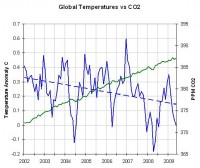
See larger image here.
Roy notes: June 2009 saw another - albeit small drop in the global average temperature anomaly, from +0.04 deg. C in May to 0.00 deg. C in June, with the coolest anomaly (-0.03 deg. C) in the Southern Hemisphere. The decadal temperature trend for the period December 1978 through June 2009 is now at +0.12 deg. C per decade.
NOTE: A reminder for those who are monitoring the daily progress of global-average temperatures here:
(1) Only use channel 5 ("ch05"), which is what we use for the lower troposphere and middle troposphere temperature products.
(2) Compare the current month to the same calendar month from the previous year (which is already plotted for you).
(3) The progress of daily temperatures (the current month versus the same calendar month from one year ago) should only be used as a rough guide for how the current month is shaping up because they come from the AMSU instrument on the NOAA-15 satellite, which has a substantial diurnal drift in the local time of the orbit. Our ‘official’ results presented above, in contrast, are from AMSU on NASA’s Aqua satellite, which carries extra fuel to keep it in a stable orbit. Therefore, there is no diurnal drift adjustment needed in our official product.
Icecap Notes: It was the 15th coldest June in the 31 years of satellite record keeping since 1979. The first half of the month was extremely cold and even snowy in south Central Canada and the northern United States. In snowed in North Dakota and in California and northern New England in early June. It was also unusually cold in the southwest - well below the normal (often 10-20 degrees) in places like Palm Springs, CA. In general, the desert southwest was unusually mild. Phoenix had 15 straight days with highs below 100F, the first time in June since 1913.
In contrast feeding off the dry soils from two years of La Nina, June, especially the second half was very hot in the southern plains and the heat expanded north and east a bit after mid-month before being suppressed again by months end.
In the northeast, the month was unusually cold, cloudy and wet. In Boston it was 4.7F below normal in a tie for 6th coldest June (with 1982) in 138 years of record keeping, all the other years were before 1916. It was just short of two standard deviations colder then normal. The NWS spot checked the average maximum temp at Boston for the month and it appears this is the second coldest average high temp since 1872. 1903 is the record. A trace or more of rain fell on 22 days of the month. Measurable (0.01 inches or more) occurred on 16 days just short of the record of 18 set in 1942.
At Blue Hill Observatory in Milton, MA, just southwest of Boston, the month of June had between 26 and 27% of the possible bright sunshine. Normal for June is 55% and the gloomiest June in 1903 had just 25% of the possible sunshine. Second place had been June, 1998, with 36%. So, this month has taken over 2nd place, not an enviable distinction for vacationers. So little sunshine and so much cool temperatures that we have heard some reports that swamp maples in parts of Maine showing fall colors!
New York City’s Central Park was also cool, cloudy and wet. The month averaged 3.7F below normal and tied with 1897 as the 8th coldest since 1869 (151 years). It rained in 23 days of the month and ended up as the second wettest June ever falling short of 1927. Recall Joe Romm of Climate Progress had blamed the rains at the US Open on global warming and chuckled the heat waves would make the climate debate in DC all that much more exciting.
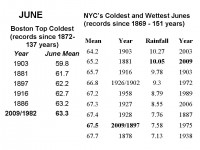
See larger image here.
The preliminary June monthly anomaly is shown below (CPC).
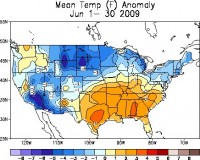
See larger image here.
In other parts of the world, Southern Brazil had one the coldest June’s in decades and New Zealand has had unusual cold and snow again this year after a banner year there and in the mountains of southern Australia last year. The Mt. Lyford Ski Area is experiencing some of the best early snow it’s ever seen. With a current 135cm average base on the slopes along with 50cm of snow fall earlier this week and an additional 5cm of windblown powder last night, ski area operator Hamish Simpson says there are “plenty of fresh tracks to be had”. “We have got the best early season snow in years,” said Mr Simpson. “Even better than last year - wall to wall white! The Terako rope has 100% cover with plenty of fresh tracks to be had.” Photo Mt. Dobson.

By Robert Felix
6 Jul 09
Dear Senator Begich,
As someone who loves my country, I urge you to vote NO on the upcoming Control-and-Tax bill, a bill purportedly designed to fight “global warming.”
What global warming?
Senator Begich, are you aware that glaciers are growing in your own state?
Yes, glaciers are growing in Alaska.
According to the US Geological Survey (USGS), glaciers are growing in Alaska for the first time in 250 years. In May, Alaska’s Hubbard Glacier was advancing at the rate of seven feet per day - more than half-a-mile per year. And in Icy Bay, at least three glaciers have advanced one-third of a mile in one year, said Chris Larsen, a scientist at the Geophysical Institute at the University of Alaska Fairbanks.
Senator Begich, I wish you would ask the USGS for a list of glaciers in Alaska, and ask them to tell you - honestly - which ones are growing. I have a feeling that there are more glaciers growing in Alaska than any of us have been told.
My fear is that that there is a giant cover up going on, especially given the fact that glaciers are also growing in California (Mt. Shasta) and Washington (Mt. Rainier, Mount St. Helens, and Glacier Peak).
Every time I read about another growing glacier, I’m told that it’s “the only glacier in the world that is bucking the global warming trend.”
But that’s not true.
Perito Moreno Glacier, the largest glacier in Argentina, is growing. Pio XI Glacier, the largest glacier in Chile, is growing. Glaciers are growing on Mt. Logan, the tallest mountain in Canada. Glaciers are growing on Mt. Blanc, the tallest mountain in France.
Glaciers (230 of them) are growing in the Western Himalayas. Glaciers are growing in Norway. Recently, all 50 glaciers in New Zealand were growing. Glaciers in Greenland are growing thicker. And contrary to what we’ve being told, the Antarctic Ice Sheet is growing, not shrinking.
More than 90 percent of the world’s glaciers are growing, but all that we hear about are the ones that are shrinking.
Not only are glaciers growing around the world, temperatures are dropping precipitously.
Are you aware that low temperature records were set in 46 states during the month of June? According to the National Oceanic and Atmospheric Administration (NOAA), some 538 low temperature records were set in June alone.
This temperature drop is not restricted to the United States.
According to Dr. Roy Spencer, climatologist and former NASA scientist, satellite data for June shows that the earth has cooled an astounding 0.74 degrees F since former Vice President Al Gore released his propaganda piece “An Inconvenient Truth” in 2006.
Again, I urge you to vote NO on any Control-and-Tax bill.
As author of the book Not by Fire but by Ice, and publisher of Ice Age Now, I can provide corroboration of the facts that I am presenting to you today, including links to do just that in this PDF.
Respectfully,
Robert W. Felix
Submitted by Hans Schreuder
Darsham, UK
I Love My Carbon Dioxide
Technical Submissions
Ignorance is temporary. Stupid is forever. Stop the insanity over man-made climate change - it does not exist.
By Dr. David Evans
Let’s break down the case for human-caused global warming logically:
1) There is plenty of evidence that global warming has been occurring recently.
2) There is ample evidence that carbon emissions causes warming and that the level of atmospheric carbon dioxide is increasing.
3) But there is no evidence that carbon dioxide emissions are the main cause of the recent global warming.
The alarmists focus you entirely on the first two points, to distract you from the third. The public is increasingly aware of this misdirection. Yes, every emitted molecule of carbon dioxide (CO2) causes some warming - but the crucial question is how much warming do the CO2 emissions cause? If atmospheric CO2 levels doubled, would temperatures rise by 0.1, 1.0, or by 10.0C?
We go through the usual “evidence” offered by alarmists, and show that in each case either it:
• Is not evidence about what causes global warming. Proof that global warming occurred is not proof that CO2 was mainly responsible.
• Is not empirical evidence; that is, it is not independent of theory. In particular models are theory, not evidence.
• Says nothing about how much the temperature would rise for a given rise in CO2 levels.
Despite spending $50bn over the last 20 years looking for evidence of point (3) above, the alarmists have found none. In two instances they expected to find it, but in both cases they found only evidence of the opposite - and they have kept awfully quiet about those cases. If they just had some evidence of (3) they could just tell us what it was and end the debate.
We note that there used to be some supporting evidence, but better data later reversed that evidence. Instead there are now at least three independent pieces of evidence that the temperature rises predicted by the IPCC due to carbon dioxide emissions are exaggerated by a factor of between 2 and 10, primarily due to the assumption of overly positive water vapor feedback in the climate models. Finally, we discuss some examples of what would constitute evidence. The evidence must of course be empirical, meaning that it is independent of theory.
Typical Evidence
Typical Alarmist Offerings of “Evidence”: Polar Bears, Glaciers, Arctic Melt, Antarctic Ice Shelves, Storms, Droughts, Fires, Malaria, Snow Melt on Mt Kilimanjaro, Rising Sea Levels, Ocean Warming, Urban Heat Island Effect. Although each of these issues may say something about whether or not global warming is or was occurring, none of them say anything about the causes of global warming. It would make no difference to these issues if the recent global warming was caused by CO2 or by aliens heating the planet with ray guns.
The IPCC Said So
So what is their evidence? Chapter 9 of their latest Assessment Report 4 (2007), “Understanding and Attributing Climate Change”, contains no evidence. That CO2 is the main cause of the recent global warming is an assumption in much of what they say, and they find many ingenious ways of saying it and implying it using complex language. But repetition is not proof, and nowhere do they present any actual evidence. If you doubt me, read it yourself then say what the evidence is in your own words.
Often the assumption takes the form that nearly all the temperature rises since the start of industrialization are due to CO2 rises, or that there are no other possible significant causes of global warming.
Computer Models are Evidence
Computer models consist solely of a large number of calculations that, individually, you could do on a hand-held calculator. So models are theoretical, and cannot form part of any evidence.
Computer Models Incorporate a Lot of Sound Empirical Science
Yes they do. The climate models contain some well-established science that has been verified by empirical observations. But they also contain a myriad of:
• implicit and explicit assumptions
• omissions
• guesses
• gross approximations.
A single mistake in any one of these can invalidate the climate models. Typical engineering models that mimic reality closely contain no untested assumptions, material omissions, guesses, or gross approximations. They are the result of mature understanding of the reality being modelled, and have been tested ad nauseum in a wide range of circumstances. On the other hand, climate science is in its infancy, individual models routinely fail most tests, the climate models are riddled with untested assumptions and guesses, they approximate the atmosphere with cells a hundred kilometres square and hundreds of meters high, and they do not even attempt to model individual cloud formations or any feature smaller than the cell size. Don’t let the word “model” fool you into thinking climate models are better than they are.
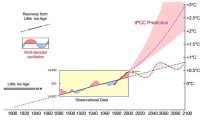
See larger image here.
Read much more here.
Comments from Weblog of Roger Pielke Sr. and others as compiled by Climate Depot
The global warming promoting website RealClimate.org, is under fire yet again from a prominent scientist for presenting incorrect climate information. Climatologist Dr. Roger Pielke Sr. publicly rebuked the website in a June 30, 2009 article for “erroneously communicating the reality of the how the climate system is actually behaving.” Pielke, the former Colorado State Climatologist and currently a senior scientist at the University of Colorado in Boulder, countered Real Climate with the latest data on sea level rise, ocean heat content and Arctic ice.
In his article titled “Real Climate’s Misinformation”, Pielke also chastised readers of Real Climate for blindly accepting the incorrect climate claims promoted on the site. “Media and policymakers who blindly accept these claims are either naive or are deliberately slanting the science to promote their particular advocacy position,” Pielke Sr. wrote.
The latest scientific woes by RealClimate.org were rebutted point by point by Pielke. Real Climate wrote: “Our regular readers will hardly be surprised by the key findings from physical climate science, most of which we have already discussed here. Some aspects of climate change are progressing faster than was expected a few years ago - such as rising sea levels, the increase of heat stored in the ocean and the shrinking Arctic sea ice.”
Pielke responded: “First, what is ‘physical climate science’? How is this different from ‘climate science’. In the past, this terminology has been used when authors ignore the biological components of the climate system,” Pielke wrote. Pielke continued: “More importantly, however, the author of the weblog makes the statement that the following climate metrics ‘are progressing faster than was expected a few years ago’”:
1. Real Climate Claim: “rising sea levels” Pielke’s Response: “NOT TRUE; e.g. see the University of Colorado at Boulder Sea Level Change analysis. Sea level has actually flattened since 2006.”
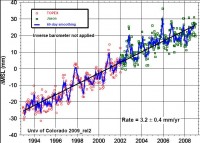
2. Real Climate Claim: “the increase of heat stored in the ocean” Pielke’s “Response: NOT TRUE; see Update On A Comparison Of Upper Ocean Heat Content Changes With The GISS Model Predictions. There has been no statistically significant warming of the upper ocean since 2003.”
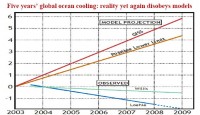
3. Real Climate Claim: “shrinking Arctic sea ice”: Pielke’s Response: “NOT TRUE; see the Northern Hemisphere Sea Ice Anomaly from the University of Illinois Cyrosphere Today website. Since 2008, the anomalies have actually decreased.”
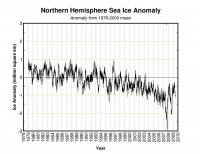
Pielke Concluded: “These climate metrics might again start following the predictions of the models. However, until and unless they do, the authors of the Copenhagen Congress Synthesis Report and the author of the Real Climate weblog are erroneously communicating the reality of the how the climate system is actually behaving. Media and policymakers who blindly accept these claims are either naive or are deliberately slanting the science to promote their particular advocacy position.”
Realclimate.org is a website which much of the mainstream media has relied on for climate science developments, has come under increasing criticism and scrutiny from scientists. Real Climate’s lead blogger and NASA scientist Gavin Schmidt was recently harshly criticized for some of his scientific claims earlier this year. Atmospheric scientist Dr. Hendrik Tennekes, a prominent scientist from the Netherlands, wrote a scathing denunciation of Schmidt in which he said he was “appalled” by Schmidt’s “lack of knowledge”. If this were not such a serious matter, I would have been amused by Gavin’s lack of knowledge of the differences between weather models and climate models. As it stands, I am appalled. Back to graduate school, Gavin! Tennekes wrote on January 29, 2009. Tennekes, is an scientific pioneer in the development of numerical weather prediction and former director of research at The Netherlands’ Royal National Meteorological Institute, and an internationally recognized expert in atmospheric boundary layer processes.
He added Gavin Schmidt is not the only meteorologist with an inadequate grasp of the role of the oceans in the climate system. In my weblog of June 24, 2008, I addressed the limited perception that at least one other climate modeler appears to have,” Tennekes wrote. From my perspective it is not a little bit alarming that the current generation of climate models cannot simulate such fundamental phenomena as the Pacific Decadal Oscillation. I will not trust any climate model until and unless it can accurately represent the PDO and other slow features of the world ocean circulation. Even then, I would remain skeptical about the potential predictive skill of such a model many tens of years into the future,” Tennekes added.
Atmospheric Physicist James A. Peden, formerly of the Space Research and Coordination Center in Pittsburgh, also critiqued RealClimate.org on June 24, 2008. Peden wrote, “‘Real Climate’ is a staged and contracted production, which wasn’t created by ‘scientists,’ it was actually created by Environmental Media Services, a company which specializes in spreading environmental junk science on behalf of numerous clients who stand to financially benefit from scare tactics through environmental fear mongering.” Read much more history of this misinformation site detailed here.
---------------------------
See also in this post about realclimate’s Stefan Rahmstorf’s opportunistic smoothing (15 years) of temperature observations for IPCC use (misuse) in UN meetings in Copenhagen in Climate Audit (it masks the recent 8 year cooling) with links to post by Lucia and David Stockwell here. Steve refers to this fiddling with the data without disclosing changes to methods used “what the “Community” calls “GARP” - Generally Accepted Realclimate Procedure.”
By Joseph D’Aleo
Thanks to Spaceweather.com for coverage of this eruption that follows:
Perfect timing. On June 12th, just as Russia’s Sarychev Peak volcano was erupting for the first time in 20 years, the International Space Station flew directly overhead. Astronauts had their camera ready and snapped one of the most dramatic Earth-science photos ever taken from space.
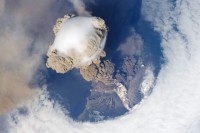
Researchers are studying this rare photo to learn about the early stages of powerful volcanic eruptions. A few phenomena stand out.
(1) The volcano erupted with such force, the plume actually punched through the atmosphere. Note how clouds around the volcano have parted in a circular ring--that is a result of a shock wave produced by the upward blast (ICECAP NOTE: more likely subsidence surrrounding the rapidly rising air in the plume). (2) The plume is a mixture of brown ash and white steam. A “dirty thunderstorm” complete with lightning could be in progress within the roiling cloud. (3) The smooth white bubble on top of the plume is probably a mass of water condensing from air shoved upward by the rising ash column. If so, it is akin to the iridescent pileus clouds sometimes featured on spaceweather.com.
If you’re not amazed yet, try this: Put on a pair of red-blue stereo glasses and behold the eruption in 3D. The anaglyph was created by graphic artist Patrick Vantuyne of Belgium. No stereo glasses? A cross-eyed version is also available.

Sarychev Peak is a stratovolcano covering almost the entirety of Matua Island in the Kuril Islands, which belong to Russia’s Sakhalin Oblast, south of the Kamchatka Peninsula. It is a young, highly symmetrical stratovolcanic cone with an elevation of 1496 m.
One of the most active volcanoes in the Kuril Islands, on June 12, 2009, it released two large ash plumes. One plume of ash spread about 105 km (65 mi) toward the west-northwest, reported the U.S. Air Force Weather Agency, and the other reached 250 km (155 mi) toward the east-southeast.
People across the USA are reporting unusual sunsets. When the sun goes down, delicate ripples of white appear over the western horizon. Then, as the twilight deepens, the sky turns a telltale shade of “volcanic lavender.” Paul Hadfield photographed this example last night, June 28th, from Latham, Illinois:


Rafael Gallego, Carrion de los Cespedes, Sevilla, Espana (Spain) June 30, 2009

Paul Laak, Republic, Washington, June 30, 2009
This animation shows the rapid spread of the sulfur dioxide around the high latitudes. Icecap Note: It will add to whatever sulfate aerosols remain from Mt. Redoubt this spring. That may contribute to less sunshine (already feeble in high latitudes especially now near this very quiet solar minimum) reaching low levels this summer and thus less melting. It may explain why arctic temperatures according to DNI Center for Ocean and Ice are hugging the melting point a few degrees below the normal for late June.
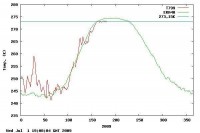
See larger here.
By Joseph D’Aleo
Now with the climate bill forced through the house even before it was finished being written and with the last minute addition of over 300 pages and certainly before it was read, the action shifts to the senate. We all need to turn our attention to our senators and make it known this bill is bad for America and that they will be held accountable for the damages done if it passes.
The administration is trying another path through the EPA as you likely know. They prefer the congressional route as the EPA regulation route could be/will be tied up in the courts. The time for public comments on the EPA endangerment findings here and the Technical Support Document has past. 3,717 comments were filed. Go to this site to see them. Some comments were asked not to be posted but considered in evaluation. Here are just a few of those most relevant that we found and or were sent to Icecap as well as those we submitted.
U.S. Chamber of Commerce filings: The Alliance for Clear Climate Economics and Science Solutions (ACCESS) was created to ensure that any regulation of greenhouse gases using existing environmental laws not harm the economy and American jobs, be based on sound science and allow for public review of all underlying data and scientific analysis. On June 23, 2009, the Chamber filed a Petition for a Formal “On the Record” Endangerment Finding using Administrative Procedure Act §§ 556 and 557. The Chamber also filed extensive written comments in response to EPA’s proposed endangerment finding for motor vehicles, analyzing the scientific, legal and policy grounds EPA has set forth for making such a finding. You can access the filings here. There was an important attachment to the main comment by Wolff here on the EPA approach taken to the relevant scientific literature in the TSD and briefly comments on the peer-review process for the TSD.
The very detailed comments Of The American Farm Bureau Federation, Deseret Power Electric Cooperative And Sunflower Electric Power Corporation on the EPA’S Proposed Endangerment Finding are here. Commenters believe that the Endangerment Finding Proposal, including the attached Technical Support Document ("TSD"), presents an incomplete discussion of climate change science. The Environmental Protection Agency ("EPA" or “Agency") has ignored literally hundreds of peer-reviewed scientific articles that are at odds with major portions of EPA’s conclusions. These studies were also not accounted for in the reports of the United Nations International Panel on Climate Change ("IPCC") and the United States Climate Change Science Program ("CCSP") on which EPA heavily relies.
Heartland’s excellent EPA comment is here. They have a listing of other posted comments here.
CEI filing is here. Chris Horner of CEI here. CEI also filed an EPA internal study autrhored by Alan Carlin that was suppressed here.
One of Dr. Roy Spencer’s comments is here.
One of Dr. John Christy’s comments is filed here.
Parts of Dr. Roger Pielke Sr.’s testimony to congress was put on file as a comment here.
Anthony Watts submitted a letter with his publication Is the US Surface Station Record Reliable.
The Heartland and Dr. Singer and Dr. Idso submitted the NIPCC report Climate Change Reconsidered .
Steve McIntyre commented on the EPA findings. Here is one of his comments.
William DiPucchio submitted this comment.
John McLean’s document on the IPCC here was resubmitted.
Icecap submitted 9 comments, summarized here with links to principal comment content.
Invited presentation video by Dr. Nicola Scafetta, Duke University to EPA February 2009 here. Powerpoint PDF is here.
Lubos Motl on US House VoteBy Lubos Motl
The bill had 1201 pages, although this full version is nowhere to be found. About 300 pages were added yesterday at 3:09 am. It became extremely clear from the proceedings that virtually no one has read the bill, especially not the brand new 300-page amendment. No one in the U.S. House actually owned a copy of this amendment during the proceedings. John Boehner, the GOP minority leader, is close to an exception and we will discuss some of his findings below.
The supporters have uniformly been delusional imbeciles, talking about a shiny future, added jobs, reduced deficits, and saving the world. They have clearly no idea what’s written in the bill and even if you told them, they wouldn’t understand what it would mean. They’re not capable of an elementary mental activity.
They’re apparently not even supposed to be thinking: they are just paid to raise their hand in favor of any stupidity that their bosses ask them to support. They’re individually irresponsible appendices of a filthy octopus. I just felt terrible for the U.S. when I saw e.g. those congresswomen who were manifestly included in the House because they were black, female, and simple-minded enough to blindly approve anything recommended by their white male “leaders”.
Let me tell start somewhere. The very size of the bill, over 1500 pages, means that most people - and even most “local experts” - have absolutely no chance to understand all of its glitches. (I offer USD 5 to the first person who shows some evidence that he or she has read the full text.) So this bill is, first of all, a stunning document transferring an immense amount of power to a few selected people who will know how to master the bill and benefit from its details.
For a comparison, a pretty good bill called the U.S. Constitution originally had four pages and it allowed a great country to work well for 230+ years. Those four pages are somewhat less than 1500+ pages whose only purpose is to allow one particular green tumor to thrive for a few years, before it dies of hunger.
John Boehner has read most of it. He showed a graph of a hundred of institutions that are expected to “conspire” to make this newly planned huge sector of the grey economy thrive. Many of these institutions are new and their name is composed out of approximately 10 words each.
The bill allows the new octopus to infiltrate the life of all the individuals, force them to look for expert opinions about all kinds of things before very basic transactions, order even villages (which often can’t afford to hire anyone) to employ useless green staff that is a part of this new mafia, force them to have power outlets (or expensive devices to sequester CO2, a harmless gas that we call life) at all conceivable and inconceivable, mostly useless places, and so on. In other words, you won’t be able and your community or company won’t be able to live normally without paying attention to the new mechanism and you won’t be able to rely on having resources because you can always be ordered to waste them for nonsensical expenses dictated by the bill.
This bill is trying to distort ways how energy is used. Now, what activities depend on energy? It’s impossible not to think about the crazy physics textbook that once made Richard Feynman so angry. The answer to all questions was “Energy makes it go”. Feynman explained that children didn’t learn anything, it was just an indoctrination by a vacuous cliché, and energy makes everything go but also stop. In fact, it is conserved, just being converted from one form to another. Sadly enough, the sentence “Energy makes everything go” is no longer vacuous with this bill because the bill implies that “Everything must be regulated”.
Meanwhile, the bill is doing nothing measurable to actually help America become energy-independent: it does nothing to help nuclear energy, the realistic domestic sources of energy are being suppressed, and the currently unrealistic domestic sources of energy will probably remain unrealistic. Moreover, the bill depends on hundreds of technicalities reflecting the current details about existing technologies such as fuel cells. If there’s any significant technological progress, which is the only hope to realize some dreams proclaimed by the bill, all these things will be getting obsolete and hundreds of pages will have to be modified and added (to describe the bureaucratic treatment of the new technologies) almost every year.
There are many regulations that imply that new billions of dollars will be moved from one place to another. However, the algorithms how to exactly calculate these billions and how to determine where they’re moved are never well-defined, as Boehner has found out: the bill was clearly written by a few random sloppy amateurs-become-professionals - or the vagueness may have been either unavoidable or deliberate.
So whatever the reason is behind the vagueness, the bill will give an immense power to those who will be able to take over this gigantic new machinery and move billions to their preferred locations (and order such transfers) - a situation that is likely to attract huge corruption and make Saddam Hussein a modest, wise, and fair manager in comparison.
The extra expenses needed for this gigantic new structure to operate are going to be paid by the “polluters”. That’s very interesting because the same bill argues that there won’t be any polluters in a near future. So who will pay for all these new green jobs at that time? Of course, this question is rhetorical because the U.S. will never get there.
The whole industrial activity of the U.S. since 1776 may have (temporarily) added something between 0.05 and 0.2C to the global temperatures (would you prefer to sacrifice the U.S. to avoid this “serious” change?), and the business-as-usual in the U.S. would contribute an additional 0.1 - 0.5C per the 21th century - i.e. until the year 2100 which is so far that almost none of us will be here to see it. I am convinced that even the IPCC will agree about the figures. The greenhouse warming is small, the U.S. only influence a small part of it, and the growth will naturally decrease in a few decades or a century because of decreasing fossil fuel reserves, anyway.
The unmeasurably small cooling to be achieved by a century of this new system - which will surely be lost in local and global fluctuations and many other effects influencing the temperature - must be a really valuable thing because the U.S. House is not only ready to add trillions of new debt but also willing to transform their previously great country to a tyranny where energy-dependent jobs will be escaping to more friendly countries, where elementary business and human acts - and indeed, even manifestations of life - will need a bureaucratic stamp and approval (by bureaucrats whose number will have to be so large that they will de facto cover every piece of the country), a nation that is going to plan a rationally unmotivated global trade war with all countries in the world that are gonna realize that similar bills are a road to hell (the U.S. want to become a bigger version of North Korea, a rogue state that must bugger everyone else about its insane ideological viewpoints, in order to mask its own self-imposed internal problems).
Is there someone in the U.S. today who will at least try to stop these blinded loons? At least the U.S. Senate? Well, I actually guess that the U.S. Senate will stop this looming storm. Meanwhile, we should better check that nothing like that will happen in Europe or at least not in the Czech Republic. Read more here.
By George Will
The Spanish professor is puzzled. Why, Gabriel Calzada wonders, is the U.S. president recommending that America emulate the Spanish model for creating “green jobs” in “alternative energy” even though Spain’s unemployment rate is 18.1 percent—more than double the European Union average—partly because of spending on such jobs?
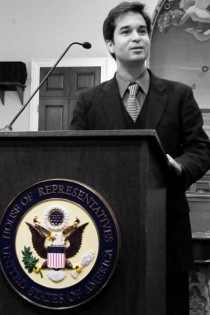
Calzada, 36, an economics professor at Universidad Rey Juan Carlos, has produced a report that, if true, is inconvenient for the Obama administration’s green agenda, and for some budget assumptions that are dependent upon it. Calzada says Spain’s torrential spending—no other nation has so aggressively supported production of electricity from renewable sources—on wind farms and other forms of alternative energy has indeed created jobs. But Calzada’s report concludes that they often are temporary and have received $752,000 to $800,000 each in subsidies—wind industry jobs cost even more, $1.4 million each. And each new job entails the loss of 2.2 other jobs that are either lost or not created in other industries because of the political allocation—sub-optimum in terms of economic efficiency—of capital. (European media regularly report “eco-corruption” leaving a “footprint of sleaze”—gaming the subsidy systems, profiteering from land sales for wind farms, etc.) Calzada says the creation of jobs in alternative energy has subtracted about 110,000 jobs elsewhere in Spain’s economy.
The president’s press secretary, Robert Gibbs, was asked about the report’s contention that the political diversion of capital into green jobs has cost Spain jobs. The White House transcript contained this exchange:
Gibbs: “It seems weird that we’re importing wind turbine parts from Spain in order to build—to meet renewable energy demand here if that were even remotely the case.”
Questioner: “Is that a suggestion that his study is simply flat wrong?”
Gibbs: “I haven’t read the study, but I think, yes.”
Questioner: “Well, then. [Laughter.]”
Actually, what is weird is this idea: A sobering report about Spain’s experience must be false because otherwise the behavior of some American importers, seeking to cash in on the U.S. government’s promotion of wind power, might be participating in an economically unproductive project.
It is true that Calzada has come to conclusions that he, as a libertarian, finds ideologically congenial. And his study was supported by a like-minded U.S. think tank (the Institute for Energy Research, for which this columnist has given a paid speech). Still, it is notable that, rather than try to refute his report, many Spanish critics have impugned his patriotism because he faulted something for which Spain has been praised by Obama and others.
Judge for yourself: Calzada’s report can be read here. And you can find similar conclusions in ”Yellow Light on Green Jobs,” a report by Republican Sen. Kit Bond, ranking member of the Environment and Public Works Committee’s subcommittee on green jobs and the new economy.
What matters most, however, is not that reports such as Calzada’s and the Republicans’ are right in every particular. It is, however, hardly counterintuitive that politically driven investments are economically counterproductive. Indeed, environmentalists with the courage of their convictions should argue that the point of such investments is to subordinate market rationality to the higher agenda of planetary salvation.
Still, one can be agnostic about both reports while being dismayed by the frequency with which such findings are ignored simply because they question policies that are so invested with righteousness that methodical economic reasoning about their costs and benefits seems unimportant. When the president speaks of “new green energy economies” creating “countless well-paying jobs,” perhaps they really are countless, meaning incapable of being counted.
For fervent believers in governments’ abilities to control the climate and in the urgent need for them to do so, believing is seeing: They see, through their ideological lenses, governments’ green spending as always paying for itself. This is a free-lunch faith comparable to that of those few conservatives who believe that tax cuts always completely pay for themselves by stimulating compensating revenue from economic growth.

Windmills of La Mancha, Spain
Windmills are iconic in the land of Don Quixote, whose tilting at them became emblematic of comic futility. Spain’s new windmills are neither amusing nor emblematic of policies America should emulate. The cheerful and evidently unshakable confidence in such magical solutions to postulated problems is yet another manifestation—Republicans are not immune: No Child Left Behind decrees that by 2014 all American students will be proficient in math and reading—of what the late senator Pat Moynihan called “the leakage of reality from American life.” See post here.




